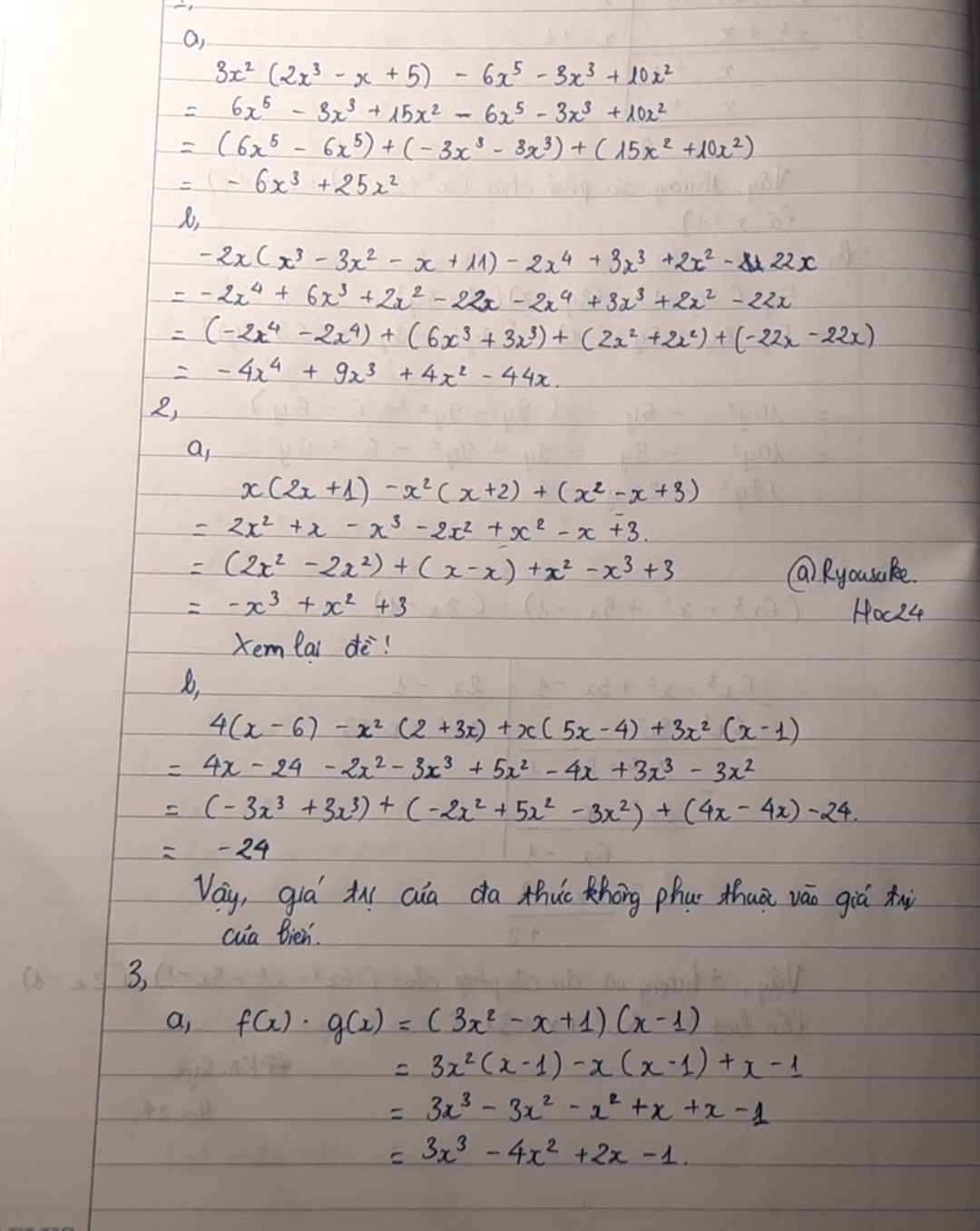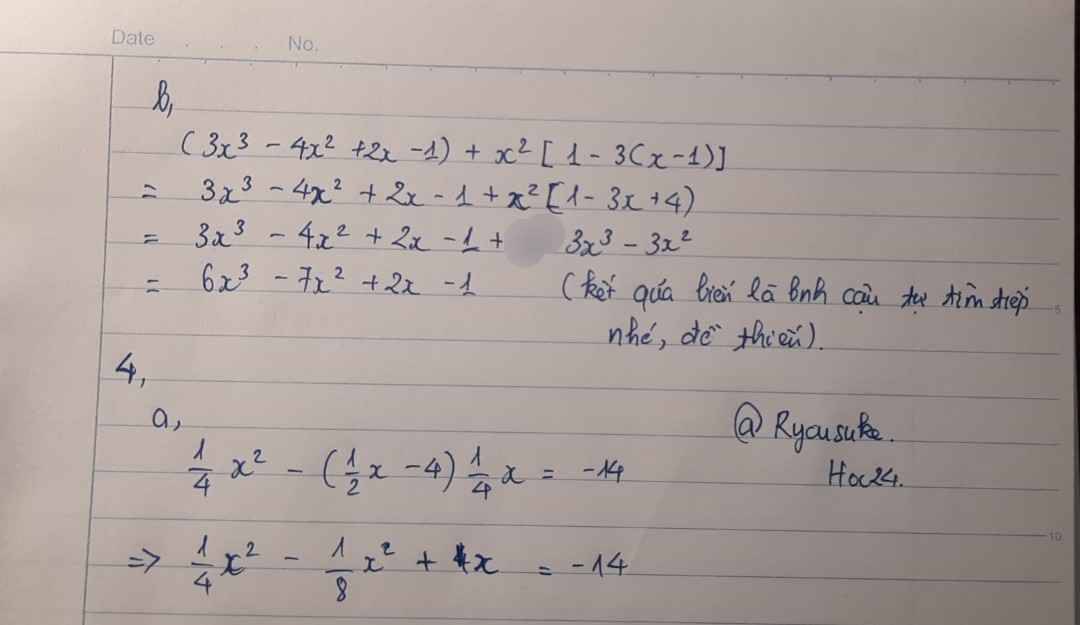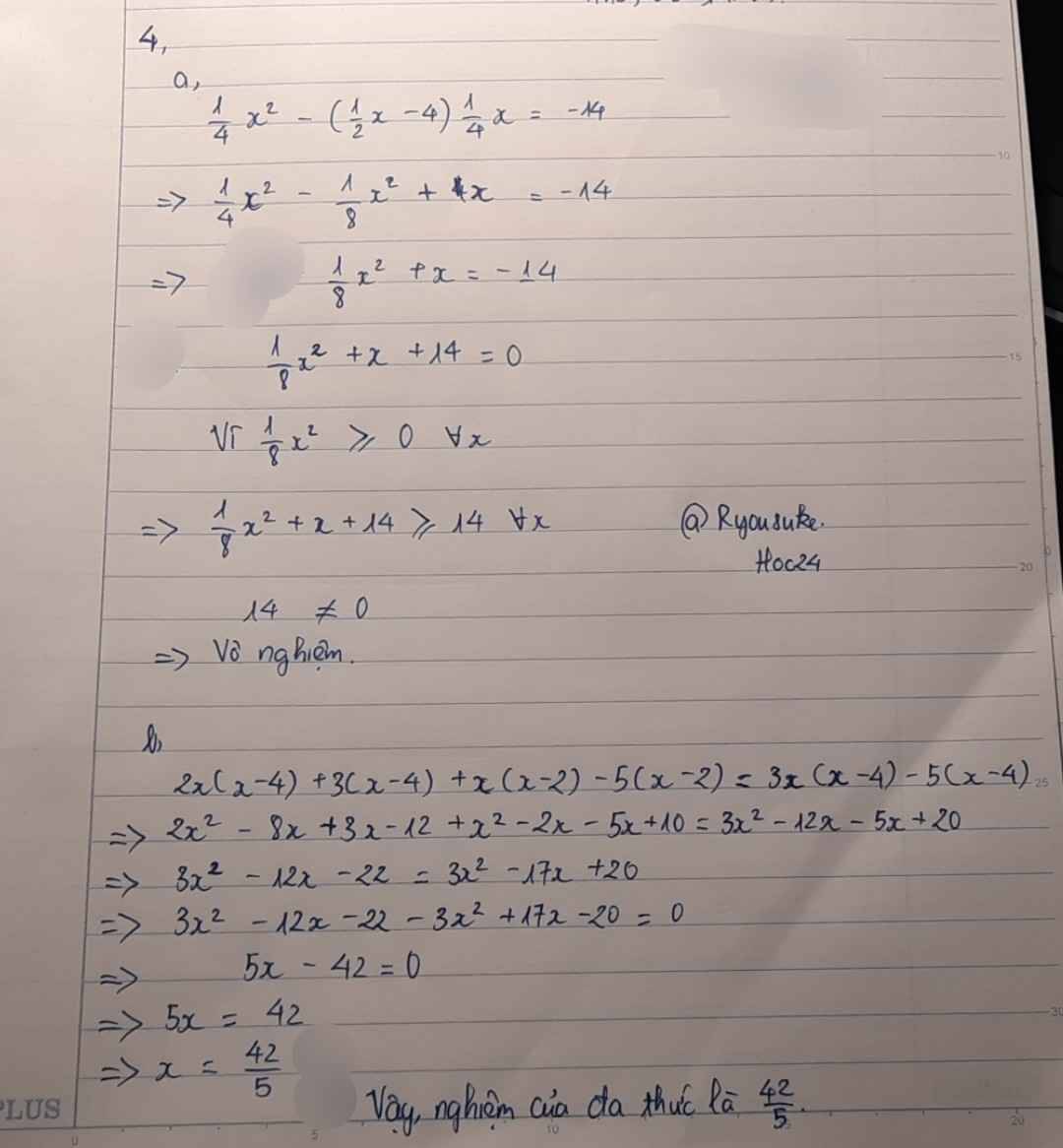giải PT sau:
x5+2x4+3x3+3x2+2x+1=0
Bài 1 .Với giá trị nào của x thì đa thức d- trong mỗi phép chia sau có giá trị bằng 0?
a. (2x4 - 3x3 + 4x2 + 1) : (x2 - 1 ) b. (x5 + 2x4 + 3x2 + x -3 ) : (x2 + 1)Giải hộ va aka: \(\dfrac{2x^4-3x^3+4x^2+1}{x^2-1}=\dfrac{2x^4-2x^2-3x^3+3x+6x^2-6-3x+7}{x^2-1}\)
\(=2x^2-3x+6+\dfrac{-3x+7}{x^2-1}\)
Để dư bằng 0 thì -3x+7=0
=>x=7/3
b: \(\dfrac{x^5+2x^4+3x^2+x-3}{x^2+1}\)
\(=\dfrac{x^5+x^3+2x^4+2x^2-x^3-x+x^2+1+2x-4}{x^2+1}\)
\(=x^3+2x^2-x+1+\dfrac{2x-4}{x^2+1}\)
Để đư bằng 0 thì 2x-4=0
=>x=2
Bài 1: Rút gọn biểu thức sau:
a. 3x2(2x3- x+5) - 6x5-3x3+10x2
b. -2x(x3-3x2-xx+11)-2x4+3x3+2x2-22x2x
Bài 2: Chứng minh biểu thức sau không phụ thuộc vào x:
a. x(2x+1)-x2(x+2)+(x2-x+3)
b. 4(x-6)-x2(2+3x)+x(5x-4)+3x2(x-1)
Bài 3: Cho đa thức: f(x)=3x2-x+1
g(x)=x-1
a. Tính f(x).g(x)
b. Tìm x để f(x).g(x)+x2[1-3g(x)]=
Bài 4: Tìm x:
a. \(\dfrac{1}{4}\)x2-(\(\dfrac{1}{2}\)x-4)\(\dfrac{1}{2}\)x=-14
b. 2x(x-4)+3(x-4)+x(x-2)-5(x-2)=3x
(x-4)-5(x-4)
Các bạn giúp mik giải bt nha. Cảm ơn mn nhiêu ạ.
`@` `\text {Ans}`
`\downarrow`
Gửi c!



Bài 1:
a) \(3x^2\left(2x^3-x+5\right)-6x^5-3x^3+10x^2\)
\(=6x^5-3x^3+10x^2-6x^5-3x^3+10x^2\)
\(=10x^2+10x^2\)
\(=20x^2\)
b) \(-2x\left(x^3-3x^2-x+11\right)-2x^4+3x^3+2x^2-22x\)
\(=-2x^4+6x^3+2x^2-22x-2x^4+3x^3+2x^2-22x\)
\(=-4x^4+9x^3+4x^2-44x\)
4:
a: =>1/4x^2-1/4x^2+2x=-14
=>2x=-14
=>x=-7
b: =>2x^2-8x+3x-12+x^2-2x-5x+10=3x^2-12x-5x+20
=>3x^2-12x-2=3x^2-17x+20
=>5x=22
=>x=22/5
Gpt: x5-x4+3x3+3x2-x+1=0
Ta có: \(x^5-x^4+3x^3+3x^2-x+1=0\)
\(\Leftrightarrow x^5+x^4-2x^4-2x^3+5x^3+5x^2-2x^2-2x+x+1=0\)
\(\Leftrightarrow\left(x+1\right)\left(x^4-2x^3+5x^2-2x+1\right)=0\)
\(\Leftrightarrow x+1=0\)
hay x=-1
CÂU1 f(x)=x5-4x3+x2-2x+1 CÂU 2 G(X)=X5-2X4+X2-5X+3 CÂU 3H(X)=X2-3X2+ 2X-5
Bài 1. Cho hai đa thức: A(x) = 5x5 + 2x + 3x3 - 3 – 2x4 - 4,5x5 và
B(x) = 4x4 - 3x3 - 1 + 2x4 + 3x2 – x – 0,5x5
a/ Thu gọn, sắp xếp các hạng tử của đa thức theo luỹ thừa giảm dần của biến x
b/ Tìm bậc, hệ số cao nhất, hệ số tự do của A(x)
c/ Tính: A(x) + B(x) ; B(x) - A(x) ;
d/ Tìm C(x) và D(x) biết C(x) - A(x) = - 7x3 và D(x) + B(x) = -7x3 + x2 – 1
a: \(A\left(x\right)=0.5x^5-2x^4+3x^3+2x-3\)
\(B\left(x\right)=-0.5x^5+6x^4+3x^3+3x^2-x-1\)
b: Bậc 5
Hệ số cao nhất 0,5
Hệ số tự do là -3
c: \(A\left(x\right)+B\left(x\right)=4x^4+6x^3+3x^2+x-4\)
\(A\left(x\right)-B\left(x\right)=x^5-8x^4-3x^2+3x-2\)
=>B(x)-A(x)=-x^5+8x^4+3x^2-3x+2
Giải các phương trình sau trên tập số phức:
a) 2x2 + 3x + 4 = 0
b) 3x2 + 2x + 7 = 0
c) 2x4 + 3x2 – 5 = 0
Tính f(x) + g(x) – h(x) biết:
f(x) = x5 – 4x3 + x2 – 2x + 1
g(x) = x5 – 2x4 + x2 – 5x + 3
h(x) = x4 – 3x2 + 2x – 5
Ta có: f(x) + g(x) – h(x)
= (x5 – 4x3 + x2 – 2x + 1) + (x5 – 2x4 + x2 – 5x + 3) – (x4 – 3x2 + 2x – 5)
= x5 – 4x3 + x2 – 2x + 1 + x5 – 2x4 + x2 – 5x + 3 – x4 + 3x2 - 2x + 5
= (x5 +x5) – (2x4 + x4) – 4x3 + (x2 + x2 + 3x2)- (2x + 5x + 2x) + (1 + 3 + 5)
= (1 + 1)x5 – (2 + 1)x4 – 4x3 + (1 + 1 + 3)x2 - (2 + 5 + 2)x + (1 + 3 + 5)
= 2x5 – 3x4 – 4x3 + 5x2 – 9x + 9
Nghiệm của phương trình x 5 - x 4 + 3 x 3 + 3 x 2 - x + 1 = 0 là:
A. x = 1
B. x = -1
C. x = ± 1
D. x = 3
Giải pt
a. X4-4x3-6x2 -4x+1=0
b 4x2 +1/x2+7=8x+4/x
C 2x4+3x3 -16x2 +3x +2=0
a, \(x^4-4x^3-6x^2-4x+1=0\)(*)
<=> \(x^4+4x^2+1-4x^3-4x+2x^2-12x^2=0\)
<=> \(\left(x^2-2x+1\right)^2=12x^2\)
<=>\(\left(x-1\right)^4=12x^2\) <=> \(\left[{}\begin{matrix}\left(x-1\right)^2=\sqrt{12}x\\\left(x-1\right)^2=-\sqrt{12}x\end{matrix}\right.\)<=> \(\left[{}\begin{matrix}x^2-2x+1-\sqrt{12}x=0\left(1\right)\\x^2-2x+1+\sqrt{12}x=0\left(2\right)\end{matrix}\right.\)
Giải (1) có: \(x^2-2x+1-\sqrt{12}x=0\)
<=> \(x^2-2x\left(1+\sqrt{3}\right)+\left(1+\sqrt{3}\right)^2-\left(1+\sqrt{3}\right)^2+1=0\)
<=> \(\left(x-1-\sqrt{3}\right)^2-3-2\sqrt{3}=0\)
<=> \(\left(x-1-\sqrt{3}\right)^2=3+2\sqrt{3}\) <=> \(\left[{}\begin{matrix}x-1-\sqrt{3}=\sqrt{3+2\sqrt{3}}\\x-1-\sqrt{3}=-\sqrt{3+2\sqrt{3}}\end{matrix}\right.\) <=> \(\left[{}\begin{matrix}x=\sqrt{3+2\sqrt{3}}+\sqrt{3}+1\left(ktm\right)\\x=-\sqrt{3+2\sqrt{3}}+\sqrt{3}+1\left(tm\right)\end{matrix}\right.\)
=> \(x=-\sqrt{3+2\sqrt{3}}+\sqrt{3}+1\)
Giải (2) có: \(x^2-2x+1+\sqrt{12}x=0\)
<=> \(x^2-2x\left(1-\sqrt{3}\right)+\left(1-\sqrt{3}\right)^2-\left(1-\sqrt{3}\right)^2+1=0\)
<=> \(\left(x+\sqrt{3}-1\right)^2=3-2\sqrt{3}\) .Có VP<0 => PT (2) vô nghiệm
Vậy pt (*) có nghiệm x=\(-\sqrt{3+2\sqrt{3}}+\sqrt{3}+1\)
Chia đa thức cho đa thức:
a) (2x4-3x3-3x2-2+6x) : (x2-2)
b) (5x3-3x2+7) : (x2+1)
a) \(\left(2x^4-3x^3-3x^2-2+6x\right):\left(x^2-2\right)=2\left(x^2-\dfrac{3}{2}x+\dfrac{1}{2}\right)\left(x^2-2\right):\left(x^2-2\right)=2x^2-3x+1\)
a: \(\dfrac{2x^4-3x^3-3x^2+6x-2}{x^2-2}\)
\(=\dfrac{2x^4-4x^2-3x^3+6x+x^2-2}{x^2-2}\)
\(=2x^2-3x+1\)
b: \(\dfrac{5x^3-3x^2+7}{x^2+1}\)
\(=\dfrac{5x^3+5x-3x^2-3-5x+10}{x^2+1}\)
\(=5x-3+\dfrac{-5x+10}{x^2+1}\)